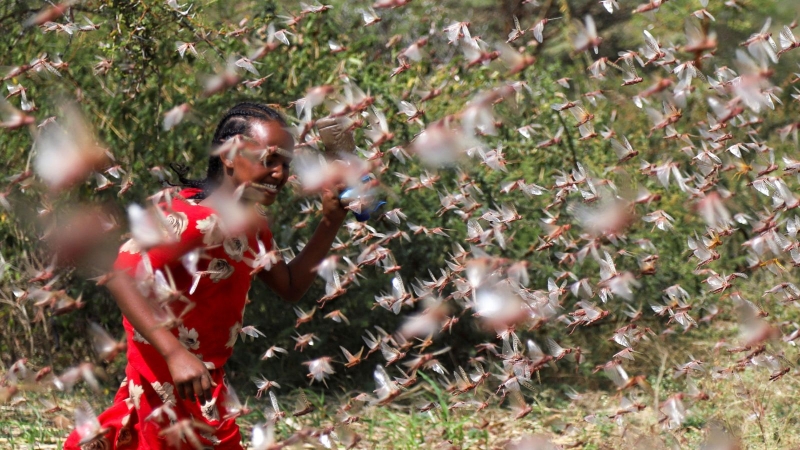UN says 13 million people in East Africa could face food crisis
The United Nations has warned if the locust swarms spreading across East Africa are not stopped now it could affect millions of people and cost more than $1bn (£766.5m).
In a stark warning to the world's governments, the UN's World Food Programme (WFP) said it will be vastly more cost effective to raise the $76m (£59m) needed to stop the swarms now instead of dealing with the consequences if it turns into a plague.
It said up to 13 million people's food security could be further threatened if the pests are not tackled imminently.
The desert locust swarms were first spotted in December in Kenya, Somalia and Ethiopia and reached Uganda on Sunday, prompting its government to deploy military forces to help with pesticide spraying.
It is the worst locust invasion Kenya has seen in 70 years and the worst in Somalia and Ethiopia in 25 years, with crops destroyed as the insects exploit wet conditions after unusually heavy rains.
"Do nothing now and WFP will need up to 15 times that amount - more than $1bn - to assist people devastated by losing crops and livelihoods.
"Preventing a catastrophe in East Africa is a far better investment than responding to its consequences and impact on the lives of millions across the region."
The FAO has so far raised $22m (£16.8m) out of the $76m it has appealed for to launch a large scale response to the locust infestation.
Desert locust swarms are now multiplying across Somalia, Kenya and Ethiopia and more have already been observed in Eritrea, Djibouti and northeastern Uganda, the regional Food Security and Nutrition Working Group warned on Friday.
"Looking forward, given favourable forecast weather conditions, swarms are expected to increase in areas already affected, as well as spread to neighbouring areas," the update said.
"There is also a high risk that locusts will spread to South Sudan."
Several million people in South Sudan are already facing hunger as the country struggles to emerge from a civil war.
The FAO also expects locusts to breed and spread in coming months as the March-April start of the long rains is forecast to encourage the locusts to breed again and spread even further.
This is the second warning this week, after the UN's humanitarian chief Mark Lowcock said a region where 13 million people already face severe food insecurity cannot afford another jolt.
The UN warned: "We simply cannot afford another major shock."
Related Posts

